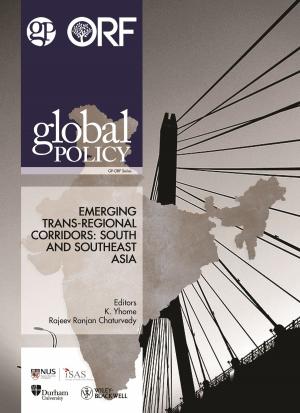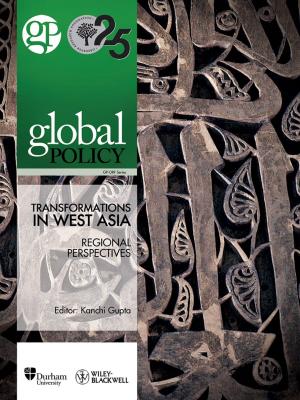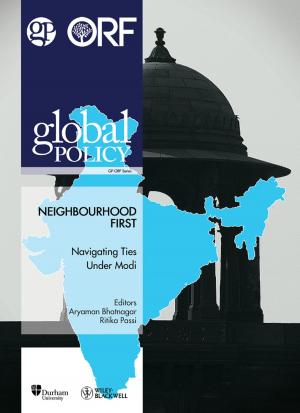| Author: | Global Policy | ISBN: | 9781310419065 |
| Publisher: | Global Policy | Publication: | July 6, 2015 |
| Imprint: | Smashwords Edition | Language: | English |
| Author: | Global Policy |
| ISBN: | 9781310419065 |
| Publisher: | Global Policy |
| Publication: | July 6, 2015 |
| Imprint: | Smashwords Edition |
| Language: | English |
The fourth publication in the GP-ORF series, the CyFy Journal Digital Debates 2015, features papers from practitioners of cyber security and internet governance across the world, who explore the implications of a changing digital arena.
The internet is now old enough to be integrated deeply in global life. It is almost impossible to consider subjects as diverse as economics or national security without reserving a place for the internet’s role in nearly all global systems. Yet the internet remains young enough to have sharp contradictions and competing visions that our age must attempt to resolve. And it remains deeply local. In his inaugural address at CyFy 2014, India’s Minister for Communications and Information Technology Ravi Shankar Prasad said, “Global can never become meaningful unless it is linked to the local. That is how I see it. The internet may have been invented by a particular country, but is today the property of the world. It is the heritage of humanity powered by diverse innovations from every part of the world. All should be welcomed, all should be made a stakeholder. That is the approach of the Government of India as far as the issue of ecosystem is concerned.”
What the minister alluded to is the inherent structural tension in the management of the internet today. By its very nature, the internet is a revisionist medium, allowing ideas and groups previously disempowered by distance (from each other or from centres of power) to achieve digital proximity and collective voice. Yet Michel Foucault’s concern that the narratives of the powerful can become true through their power remains alive in the internet age, as the digital arena remains inequitable and access begets voice. If the internet is democratic, it has a restrictive suffrage.
Contents
Editor’s Note
Achieving Digital Proximity and Collective Voice - Samir Saran
India and the Cyberworld
Today’s Decisions, Tomorrow’s Terrain: Strategic Directions for India in Shaping the Future of Cyberspace - Erin English and Aaron Kleiner
Cyber Security: Build-up of India’s National Force - Gabi Siboni
A Case for Leapfrogging the Digital Divide - Ankur Sarin and Kavitha Ranganathan
Data Security: Challenges and Opportunities for Indian Industry - Kamlesh Bajaj and Rahul Jain
International Cooperation
Espionage, Cyber Warfare and International Law - Fernando Crespo and Renato Flores
An Internet of the People, by the People, for the People - Karsten Geier
Protecting the Global Internet through MLAT Reform - Jonah Force Hill
Network Diplomacy in Digital Networks - Patryk Pawlak
Global Internet Governance
Sovereignty will Reshape Internet Governance - James Lewis
A Fork in the Road to the Future of Global Internet Governance: Examining the Making and Implications of the NETmundial Initiative - Parminder Jeet Singh
Evolving with our Stakeholders: ICANN’s Programme of Inclusion and Development - Yu-Chuang Kuek
Privacy and security
Security and Privacy in Mobile Health - Siddharth Verma
Security: Privacy, Transparency and Technology - Sunil Abraham, Elonnai Hickok and Tarun Krishnakumar
Looking Ahead
The Shifting Digital Pivot: Time for Smart Multilateralism - Samir Saran and Mahima Kaul
The fourth publication in the GP-ORF series, the CyFy Journal Digital Debates 2015, features papers from practitioners of cyber security and internet governance across the world, who explore the implications of a changing digital arena.
The internet is now old enough to be integrated deeply in global life. It is almost impossible to consider subjects as diverse as economics or national security without reserving a place for the internet’s role in nearly all global systems. Yet the internet remains young enough to have sharp contradictions and competing visions that our age must attempt to resolve. And it remains deeply local. In his inaugural address at CyFy 2014, India’s Minister for Communications and Information Technology Ravi Shankar Prasad said, “Global can never become meaningful unless it is linked to the local. That is how I see it. The internet may have been invented by a particular country, but is today the property of the world. It is the heritage of humanity powered by diverse innovations from every part of the world. All should be welcomed, all should be made a stakeholder. That is the approach of the Government of India as far as the issue of ecosystem is concerned.”
What the minister alluded to is the inherent structural tension in the management of the internet today. By its very nature, the internet is a revisionist medium, allowing ideas and groups previously disempowered by distance (from each other or from centres of power) to achieve digital proximity and collective voice. Yet Michel Foucault’s concern that the narratives of the powerful can become true through their power remains alive in the internet age, as the digital arena remains inequitable and access begets voice. If the internet is democratic, it has a restrictive suffrage.
Contents
Editor’s Note
Achieving Digital Proximity and Collective Voice - Samir Saran
India and the Cyberworld
Today’s Decisions, Tomorrow’s Terrain: Strategic Directions for India in Shaping the Future of Cyberspace - Erin English and Aaron Kleiner
Cyber Security: Build-up of India’s National Force - Gabi Siboni
A Case for Leapfrogging the Digital Divide - Ankur Sarin and Kavitha Ranganathan
Data Security: Challenges and Opportunities for Indian Industry - Kamlesh Bajaj and Rahul Jain
International Cooperation
Espionage, Cyber Warfare and International Law - Fernando Crespo and Renato Flores
An Internet of the People, by the People, for the People - Karsten Geier
Protecting the Global Internet through MLAT Reform - Jonah Force Hill
Network Diplomacy in Digital Networks - Patryk Pawlak
Global Internet Governance
Sovereignty will Reshape Internet Governance - James Lewis
A Fork in the Road to the Future of Global Internet Governance: Examining the Making and Implications of the NETmundial Initiative - Parminder Jeet Singh
Evolving with our Stakeholders: ICANN’s Programme of Inclusion and Development - Yu-Chuang Kuek
Privacy and security
Security and Privacy in Mobile Health - Siddharth Verma
Security: Privacy, Transparency and Technology - Sunil Abraham, Elonnai Hickok and Tarun Krishnakumar
Looking Ahead
The Shifting Digital Pivot: Time for Smart Multilateralism - Samir Saran and Mahima Kaul















